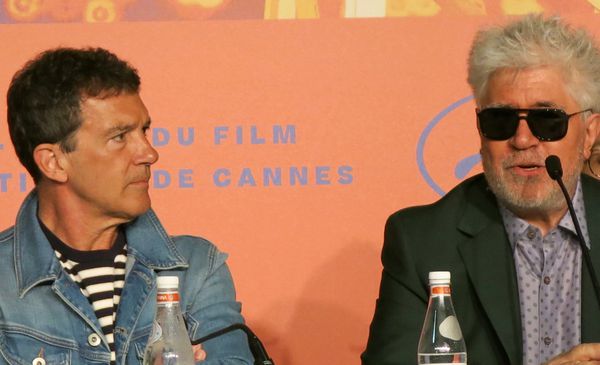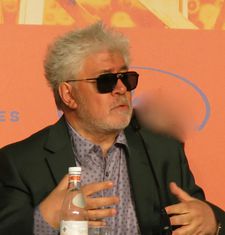 |
| Antonio Banderas and Pedro Almodóvar at the Pain And Glory Cannes press conference Photo: Richard Mowe |
A frequent visitor to the Cannes Film Festival Spanish director Pedro Almodóvar who turns 70 in September has yet to win the Palme d’Or despite being included in the Competition no less than six times.
Judging by the rave reviews and rapturous response he may well be in with a chance this time around. Even if he doesn’t, the reception for Pain And Glory, screened last night, will be recompense enough, judging by his comments when he met the media today (18 May).
 |
| Antonio Banderas at the Pain And Glory Cannes press conference Photo: Richard Mowe |
With a nod to the inclement Riviera weather, he said “I have never seen such happy rain in my life. Obviously I can never forget last night, the experience we had is something unheard of and we are very happy.”
He suggests that the film is the final part of a trilogy that began with Law Of Desire in 1987 and continued with Bad Education in 2004. It is unquestionably one of his most personal and introspective films to date.
A frequent collaborator with the director, Antonio Banderas is also in attendance at the Festival with co-star Penélope Cruz. He plays a character who is Almodóvar’s alter ego - an ageing gay film director.
Almodóvar warns: "Do not take the film literally. It is not about Pedro did this and Pedro did that. There is a whole part of fiction in the film. I do have a bad back and maybe Antonio’s character is contaminating me with some of his troubles but since yesterday I have begun to feel better. There is lot to take on board - it is not just the journey we have made together over 40 years but it is also about the history of our country and what we have been through.”
Picking up on one of the film’s themes about addiction, Banderas suggested that at this stage in his life his main addiction is to sleep eight hours every night. “And know that I will make another film - just like the character. That is the idea of the character that I play, the idea of not being ready physically to make another film. This film has helped me very much. And there was something new brought about by this stroke that I had [two years ago Banderas was rushed to hospital with a suspected heart attack].
 |
| Penélope Cruz at the Pain And Glory Cannes press conference Photo: Richard Mowe |
“It is something that is hard to define - finding myself again, and maybe I’ll become a new Antonio Banderas. The film does not just deal with addiction but also reconciliation and the circles and the spaces that have been left open in our lives and that we have to close with our family, lovers, and, of course, cinema. Maybe that is why people relate to this film so much because people also have pain in their lives and that is what the film shows.”
Cruz, who plays the mother figure (based on Almodóvar’s own mother) suggested the she has become “addicted” to her family and that is even more the case since she became a mother. "This has saved me from many problems and helped me to connect to my life through my family.
“And I also share an addiction to cinema: I started when I was 17 and I still remember when I finished the very first shooting that I felt that if it was the last one I would not be able to stand it. If it all stopped then I would not know what to do with my life. I realise that performing has also become an addiction. Every time it feels like a totally new adventure and that you do not know anything.”
The title is Pain and Glory but there is not much glory, and is glory an obstacle or does it nurture?
Almodóvar notes that the main character lives in a beautiful flat, surrounded by works of art. "His pain has nothing to do with the pain that is felt by many people. Even what the doctor says, that other people suffer more than he does, it is all relative. My ambition has always been to tell stories and make films and make them in the most beautiful way, in my little state of mind.
“I have always been able to make the films I have wanted to make, and the mistakes I have made have been mine. Nobody else is responsible for them. I am the master of my own career. That for me is the definition of success. You have to be careful not to lose your mind, and remain grounded.”
 |
| Pedro Almodóvar at the Pain And Glory Cannes press conference Photo: Richard Mowe |
With the adulation he has felt in Cannes this time and over the years he feels he has been adopted by the French. “Once they adopt you it is forever as Julio Iglesias found out. The French audience is also loyal forever. So I have to say I am a Franco-Spanish filmmaker.”
Almodóvar remains close to his family which is shown in the film. “I know what it is like to emigrate to a different region. And I know how difficult this can be when it happens to a child at the age of nine. So with my eyes of a nine year old, the misery of the post War Spain was not something I was too aware of because I lived in my own colourful world and reality. I am very proud of the scene in which the child feels that first desire, because it had to be very subtle.
“I did not fall in love in quite that way but it could have happened to me so again the film should not be taken too literally. When you first start writing a script the first lines are definitely from your own life but then fiction takes over. And from that moment as a writer you have to stick to fiction and not to reality. It has to be credible as a fiction.
“I find it very beautiful in the scene where the two 50-year-old men kiss with such passion and excitement - I would never have dared to be so intimate. We do not often get to see such images of people of that age. I did experience a love that was aborted, that was broken. When you have to separate from a person you still love that is something that is not natural.”
Almodóvar has started to write his next film. “There are two potential stories. It is not the first time that I have started writing a script and then find out that I am not fascinated enough to make it. My fear is not simply being unable to write, but not to feel the passion for the next cinematic adventure. Both the stories are adaptations. The best way to combat creative fears is to go forward with stories that interest you. You have to tell a story as if your life depended on it.”





















